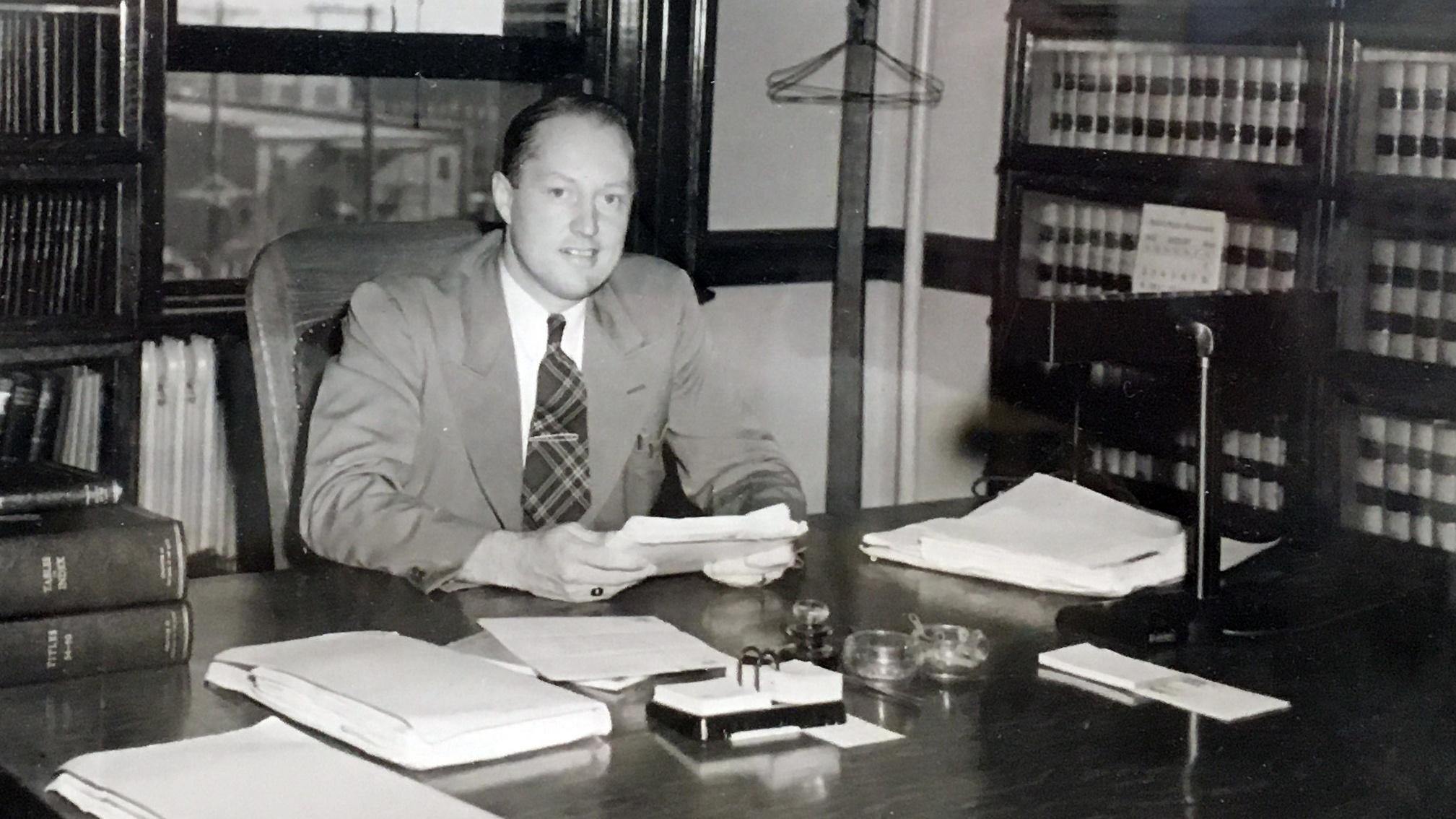Lori Walsh: Welcome back to In The Moment. I'm Lori Walsh. Leo Flynn was born in Iowa but the family moved to a farm near Milbank in his youth. He attended Milbank high school and went on to earn a law degree from Creighton University in Omaha. Flynn was among the founding members of the South Dakota Rural Electric Association in 1942. South Dakota author Chuck Cecil in his book, "Going the Extra Mile" notes that Flynn was known both locally and nationally as 'Mr. R.E.A." Flynn wrote or co-wrote many of the legislative actions that made rural electrification possible from a regulatory standpoint. He started organizing and working with rural electric cooperatives in 1937 and continued his REA work through he mid-1970s. Later in life, Flynn supported philanthropic projects amounting to over $27 million dollars in Milbank and beyond. The Leo Flynn Trust is also a supporter of South Dakota Public Broadcasting. Leo P. Flynn is the subject of this week's Images of the Past. Joining us with more is Arlo Levison, a member of the Grant County Historical Society in Milbank.
Arlo Levison: You are welcome. Thank you for calling us. We're excited to be here and excited to talk about Leo Flynn.
Lori Walsh: What a remarkable-
Arlo Levison: I can also tell you that I'm sitting in a house on the South Dakota side overlooking the beautiful Big Stone Lake and we still have our leaves. Wow.
Lori Walsh: Oh nice. Oh, that's a lovely image. I needed that.
Arlo Levison: It's windy of course, so we might lose them, but we've got them yet.
Lori Walsh: Oh, Arlo. We've been waiting all hour to hear some good news and there it is.
Arlo Levison: There it is. There it is. You bet. Yeah. It's supposed to be whatever, 70 degrees or pretty close to that. Yeah. It's a great day to be in South Dakotan.
Lori Walsh: Let's talk about another great South Dakotan, Leo P. Flynn. What kind of person was he? What can you tell me?
Arlo Levison: What can I tell you? Well, I'll tell you what. I knew him. He passed away in 2001 and I got to know him. I'm from here. I'm originally from Stockholm, which is out in the western part of the county. Leo Flynn was, when I was growing up, he was a fixture already. Well-known. Like you mentioned in the intro, he was nationally known, but he was also known locally very, very well. He was known back then and it continued throughout his life, he was a very frugal man. He was not married. He lived by himself. He had inherited the farm, the farm, which was on the eastern side of Milbank. Pretty much that land today, incorporated into the town, but not. Then back then the farm was a little bit out, not very far. But, he was very articulate.
He was, of course, obviously, he was a very bright man. Brilliant might be another word that you could use to describe him. When he graduated, he went to Creighton. They came from Iowa and when he graduated from high school in 1933 from the Milbank High School, he was able to go down to Creighton University in Omaha and was, he obtained his Juris Doctorate there, but he was also number one in the class. He's a bright guy and he came back and went to work and so forth. He was much older and much later in life when I got to know him. I came back in 1990 to be the School Superintendent in the Grant Dual School District. When I'd see him and I'd see him occasionally, and he'd always, he addressed me as the soup. S-O-U-P.
As in, in the soup. He had a sense of humor and he always laughed a little bit. That was my experience with him. He could ask me about this and ask me about that. Most of the questions, maybe had a little bit of a legal background, especially as he related to kids. He was much concerned about kids doing right. By the way, I want to say he was a big supporter of McCrossan's Boy's Ranch, down in Sioux falls. I don't know if that's come out very often, but he was. He had concerns in that area and so what I did for a living, so to speak, fit in with his concerns. But, I also knew, I experienced his generosity, but I also knew that he was very, very close with the dollar, his attire, his clothing, what he wore and all that kind of stuff.
He was not a fashion plate. He was quite the opposite. I don't want to say that he was in any way slovenly, but he just was very conservative, careful with the dollar, as far as that goes. But, as he became older in life, he became very generous and gave, he became pretty well known for handing out or giving out or supplying checks that were in the denominations of a $10,000. We'd get a $10,000 check.
Lori Walsh: Yeah.
Arlo Levison: The Grant County Historical Society received one. My wife Paulette was the mayor of Revillo during this time. I believe they received two checks. I think both of them were for the town of Revillo, to do things down there.
Lori Walsh: I want to jump-
Arlo Levison: It's like, wow, here comes a $10,000 check from Leo Flynn. That's really cool.
Lori Walsh: Generosity. I want to jump in Arlo here, before we run out of time and talk about this. I know, right?
Arlo Levison: You haven't had a chance to ask a question. I know. I'm sorry.
Lori Walsh: This concept of the lights coming on in South Dakota though. It wasn't easy. Rural electrification was not universally loved and people thought it was socialism. This idea of co-ops. What can you tell me a little bit about these efforts that Leo P. Flynn made - about bringing electricity to Milbank and other rural South Dakota communities and how hard it was to get people to see the light?
Arlo Levison: Well, now, as far as the town Milbank, ends up not being on REA. It was one of the very few towns that was unserved by REA. Yet, REA got started in South Dakota, right here in this area. A little bit, a little mix under Otter Tail (power company). Okay. That's just an aside. My sense of it, in talking with the folks that, the few folks that might still remember this, he was so articulate that when he met and talked and he started organizing in 1937, and the very first rural electrification meeting was in 1937. He and his sister May, who had been a DOD teacher, meaning Department of Defense teacher, and she worked on bases throughout the world. She was back here and she helped him in his effort, but he was very articulate about it. He would, he could convince people.
What he would say was, especially for farm families, given that Milbank, the town, was not in the design, he was really talking about farm families. What he would say was, "Okay with electricity, you no longer have to use your outdoor toilets. You can have the indoor." Wow. Now, don't you think that would impress people? You would think it would.
Lori Walsh: It seems like important to me.
Arlo Levison: Hot baths anytime you want. We can get hot water heaters. These things will be, you can take it. You can have indoor plumbing. You can have a hot shower. You can actually dry your hair. Can you imagine, drying your hair with electricity? Then you can have a warm bed. There are such things as electric blankets that might be coming down the road. The concept of creature comforts, he stressed that and he made a big point out of that and how can you be against that? Then as far as farm, the work on the farm, well, I experienced that, when electricity came to our farm, all of a sudden water flowed a lot more easily than it used to. The milking, we milked cows like everybody else, hand milking. I was fortunately, thank God, a little bit too young for that. I didn't have to do that. But, as soon as I understood that what the whole process was, we had milk machines. So, we were able to use electricity to milk cows. Wow.
Lori Walsh: Wow. Arlo-
Arlo Levison: It was like, I missed that.
Lori Walsh: I'm going to have to-
Arlo Levison: Okay. I'm fine.
Lori Walsh: Arlo, I have to interrupt you and it's painful. It's painful for me to say this, but we're out of time today for this conversation. You're going to have to come back and tell us more about this at some other day.
Arlo Levison: That's what happens to me every time. I have a local radio show on KMSD here at Milbank.
Lori Walsh: Wonderful.
Arlo Levison: We usually start at 9:20 and we go to 10 o'clock and we never have enough time. We're always running out of time.
Lori Walsh: All right. Well, you come back because there's more days ahead of us. Enjoy those leaves today and the beautiful South Dakota weather and the view. Thank you, Arlo.
Arlo Levison: Okay. Well, I appreciate you calling. Thank you.




